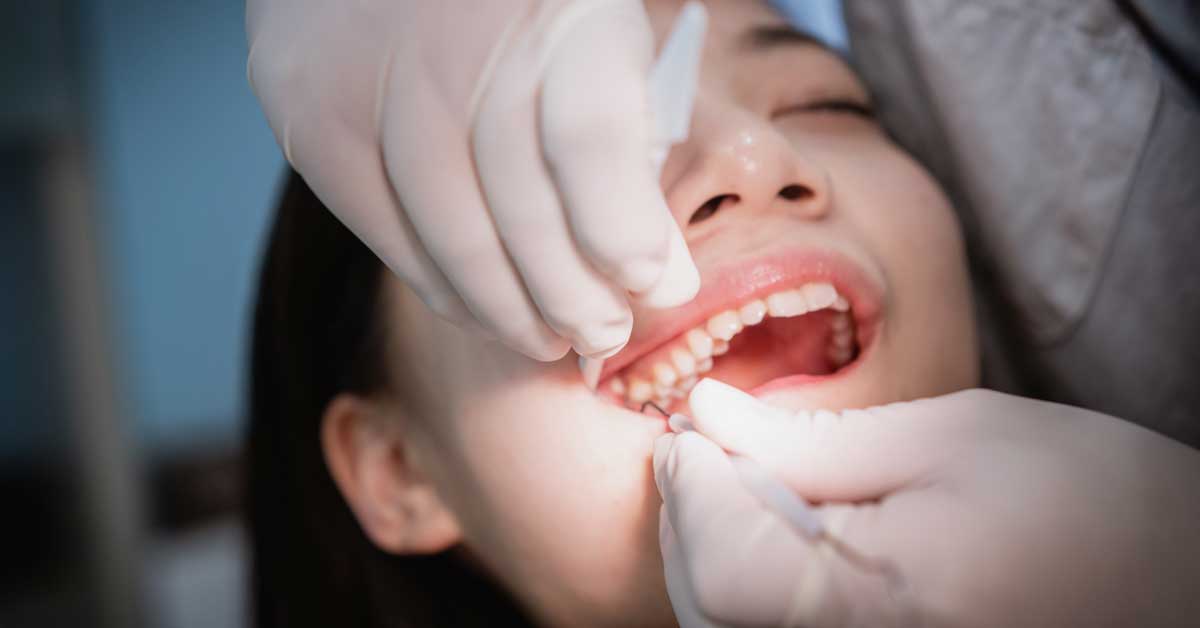Do Veneers Make Your Breath Stink?
If you’re considering getting veneers to enhance your smile, you may have heard some rumors about a potential downside: bad breath. But is there any truth to this claim? Do veneers really make your breath stink? Let’s explore the facts and dispel any myths surrounding this topic.
Veneers are a popular cosmetic dental treatment used to correct a range of dental imperfections, from broken or stained teeth to cracks or discoloration. They are thin porcelain shells that are bonded to the front surface of your teeth, giving you a flawless smile.
However, some individuals have reported experiencing bad breath after getting veneers. Now, the question arises, is it the veneers themselves that cause bad breath, or are there other factors involved?
Porcelain veneers themselves do not typically cause bad breath. However, poor oral hygiene, gum disease, poorly fitted veneers, and tooth decay can contribute to bad breath around veneers.
Key Highlights
-
Veneers are a restorative dental treatment used to correct broken, stained, cracked, or discolored teeth.
-
Bad breath after getting veneers can be attributed to inadequate oral hygiene practices, gum disease, poorly fitted veneers, or tooth decay.
-
Addressing bad breath with veneers involves deep cleaning, replacing poorly fitted veneers, and treating tooth decay.
-
Maintaining oral hygiene with veneers requires proper brushing, flossing, and using dental care products designed for veneers.
-
Regular dental check-ups are vital for maintaining oral health and addressing any issues that may contribute to bad breath.
Causes of Bad Breath with Veneers
Several factors can contribute to bad breath in individuals with veneers. Inadequate oral hygiene practices, such as not brushing and flossing properly, can lead to a buildup of plaque and bacteria, resulting in unpleasant breath.
Gum disease, characterized by red, swollen, and bleeding gums, can also cause foul-smelling breath. Poorly fitted veneers can create spaces where food particles and bacteria can accumulate, leading to odor. Additionally, tooth decay under veneers can release unpleasant smells.
Addressing Bad Breath with Veneers
Bad breath caused by veneers can be effectively addressed through various dental treatments and diligent oral hygiene practices. To overcome this challenge, it’s important to explore the following options:
-
Deep Cleaning: Your dentist can perform a deep cleaning procedure to remove tartar and plaque deposits that accumulate around the gum line. This process not only helps combat bad breath but also reduces gum inflammation.
-
New Veneers: If your existing veneers do not fit properly, your dentist may recommend replacing them with new veneers. Properly fitting veneers ensure there are no spaces for food particles and bacteria to accumulate, which can contribute to unpleasant odors.
-
Treatment for Tooth Decay: Dental decay under veneers can release foul smells. Seeking appropriate treatment options, such as fillings or root canals, can eliminate this source of bad breath, restoring oral freshness.
-
Maintaining Oral Hygiene: Consistently practicing good oral hygiene is essential for preventing and managing bad breath. Brushing your teeth thoroughly at least twice a day, flossing daily, and using mouthwash help remove plaque, bacteria, and food particles that can contribute to odor.
By combining these approaches, you can effectively address bad breath caused by veneers while maintaining optimal oral hygiene and ensuring your breath stays fresh and pleasant.
Maintaining Oral Hygiene with Veneers
Proper oral hygiene is essential in maintaining fresh breath and overall oral health with veneers. In order to keep your veneers looking and feeling their best, it is important to follow a consistent oral care routine. Here are some key steps to keep in mind:
Brushing Teeth with Veneers
When brushing your teeth with veneers, it is recommended to use a soft-bristled toothbrush and a gentle brushing technique. Be sure to brush all areas of your mouth, including the front, back, and sides of your veneers.
Flossing with Veneers
Flossing is crucial for removing debris and plaque that may accumulate between your teeth and veneers. You can use traditional floss, interdental brushes, or water flossers to effectively clean these spaces.
Using Mouthwash
Mouthwash can be a valuable addition to your oral hygiene routine, as it can help freshen breath and kill bacteria. Look for a mouthwash that is specifically designed for veneers and follow the instructions for use.
Saliva-Stimulating Products
Promote saliva flow to wash away bacteria and food particles by using saliva-stimulating products. Chewing sugar-free gum or consuming sugar-free candies can help stimulate saliva production. Saliva acts as a natural cleanser for your teeth and veneers, maintaining optimal oral health.
Choosing Dental Care Products for Veneers
Using dental care products that are specifically designed for veneers can help maintain their appearance and cleanliness. Look for fluoride toothpaste that is gentle on veneers and consider using a toothbrush with soft bristles.
Remember, maintaining good oral hygiene practices is crucial for the longevity and freshness of your breath with veneers. By following these steps and visiting your dentist regularly for check-ups, you can ensure the health and beauty of your veneers.
The Importance of Dental Check-ups
Regular dental check-ups are crucial for individuals with veneers to ensure optimal oral health. During these visits, dentists can assess the condition of your veneers and detect any issues that may arise, such as plaque buildup, gum disease, or decay under the veneers. Dental check-ups are essential for:
1. Early Detection of Problems
During a dental check-up, your dentist will thoroughly examine your veneers and surrounding oral tissues to identify any signs of plaque buildup, gum disease, or decay. Early detection is key to preventing further complications and addressing issues promptly.
2. Professional Cleaning
In addition to examining your veneers, dental check-ups include a professional cleaning. Your dentist or dental hygienist will remove any plaque or tartar buildup, ensuring that your veneers and natural teeth remain clean and healthy. Regular dental cleanings help prevent plaque buildup and maintain oral hygiene.
3. Monitoring Oral Health
A dental check-up allows your dentist to monitor your overall oral health and identify any potential problems that may affect your veneers or oral hygiene. This includes assessing the health of your gums, checking for signs of oral infections, and evaluating the surrounding teeth and tissues. Monitoring your oral health is crucial for the longevity and optimal functioning of your veneers.
4. Guidance and Recommendations
Your dentist can provide personalized guidance and recommendations during your check-up, helping you maintain proper oral hygiene practices at home. They can suggest specific products and techniques for brushing and flossing with veneers, as well as provide advice on maintaining optimal oral health. Following these recommendations can prevent issues such as bad breath, plaque buildup, and oral infections.
Long-Term Effects of Veneers on Breath
When properly maintained, veneers should not have long-term negative effects on breath. It is essential to prioritize good oral hygiene practices to ensure breath freshness, gum health, decay prevention, and prevent oral infections.
Regular brushing and flossing, combined with proper dental care, can significantly contribute to maintaining a fresh breath with veneers. By consistently removing plaque and bacteria buildup, you can prevent gum disease, tooth decay, and the development of oral infections that can cause bad breath.
To ensure the long-term effectiveness of veneers and maintain breath freshness:
-
Brush your teeth at least twice a day using a soft-bristled toothbrush and fluoride toothpaste.
-
Floss daily to remove plaque and food particles lodged between your teeth and veneers.
-
Rinse your mouth with an antimicrobial mouthwash to kill bacteria and freshen your breath.
| Benefits of Regular Dental Check-ups | Actions |
|---|---|
| Detect and Prevent Decay | Address tooth decay promptly to prevent bad breath and preserve oral health. |
| Monitor Gum Health | Regularly assess gum health to prevent gum disease, which can contribute to bad breath. |
| Professional Cleaning | Remove plaque and tartar build-up, reducing the risk of bad breath. |
Conclusion
In conclusion, proper oral hygiene practices are essential for individuals with veneers to combat bad breath and maintain optimal oral health. Failure to follow these practices can contribute to unpleasant breath. However, by regularly brushing and flossing, using appropriate dental care products, and visiting the dentist for check-ups, you can ensure fresh breath and longevity of your veneers.
Remember to adhere to a consistent oral hygiene routine, which includes brushing your teeth at least twice a day and flossing daily. Using dental care products specifically designed for veneers, such as fluoride toothpaste, can help maintain their appearance and cleanliness. Additionally, regular dental check-ups will allow your dentist to detect any issues early on and provide appropriate treatment.
By actively maintaining good oral hygiene practices and seeking professional dental care when necessary, individuals with veneers can enjoy a confident smile, fresh breath, and long-term oral health.
Frequently Asked Questions
No, veneers themselves do not cause bad breath. Issues like poor oral hygiene, gum disease, improperly fitted veneers, and tooth decay beneath the veneers are common contributors to bad breath in individuals with veneers.
Maintain good oral hygiene by brushing at least twice a day, flossing daily, and using mouthwash. Regular dental check-ups are crucial for addressing any potential issues like plaque buildup or tooth decay that could cause bad breath.
Yes, use a soft-bristled toothbrush and gentle brushing motions to clean all areas around and under the veneers without damaging them. Brushing thoroughly helps prevent plaque and bacteria buildup that can lead to bad breath.
Yes, veneers that do not fit properly can create spaces where food particles and bacteria can accumulate, leading to unpleasant odors. If you suspect your veneers are poorly fitted, consult your dentist for an evaluation.
Treatments include deep cleaning to remove plaque and tartar, replacing poorly fitted veneers, and addressing tooth decay. These measures can eliminate sources of bad breath and improve oral health.
Veneers In Miami, FL
Don’t wait any longer to achieve the smile you’ve always wanted. Schedule a consultation with our cosmetic dentistry experts today and discover how Veneers can transform your appearance and enhance your confidence.



